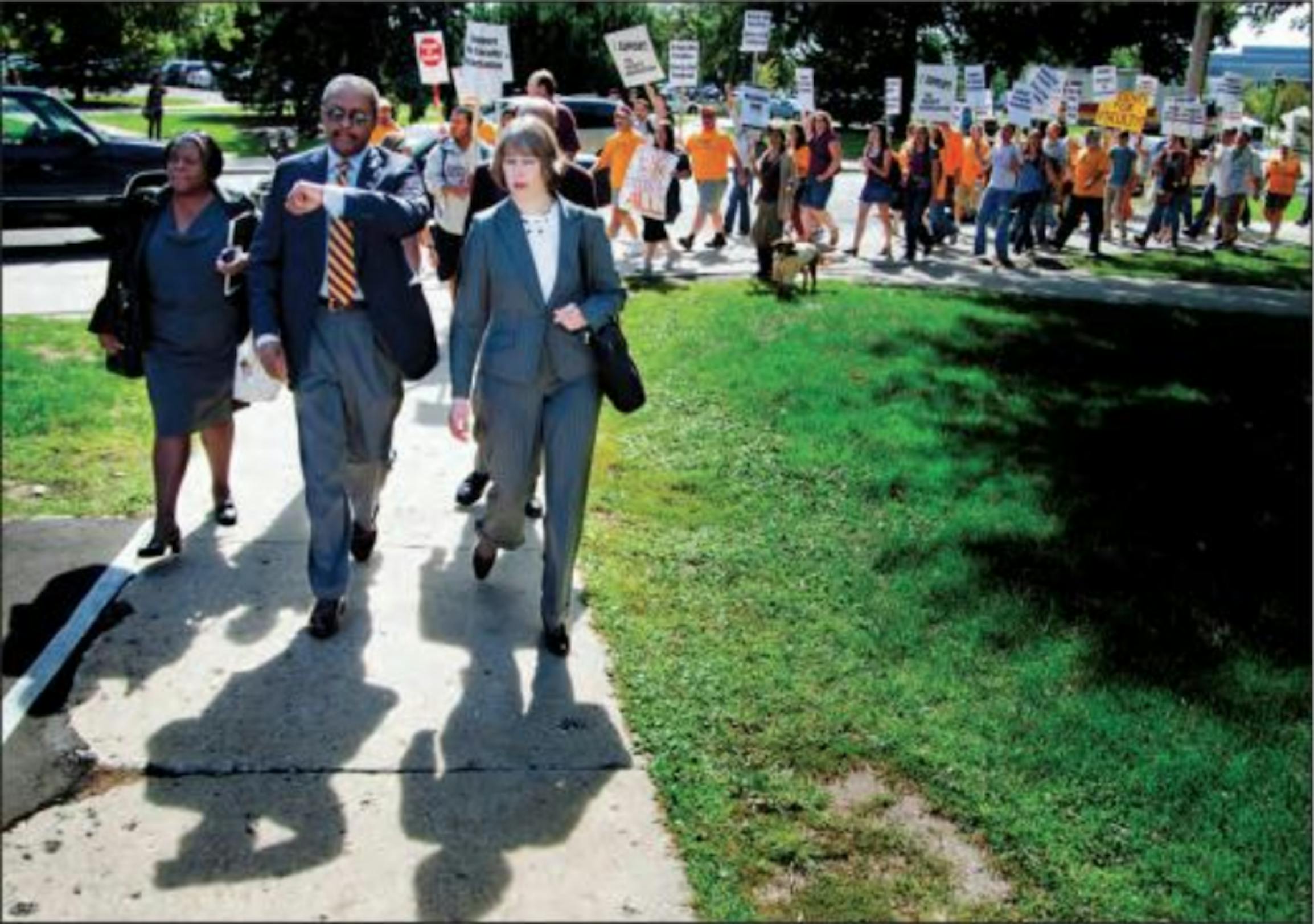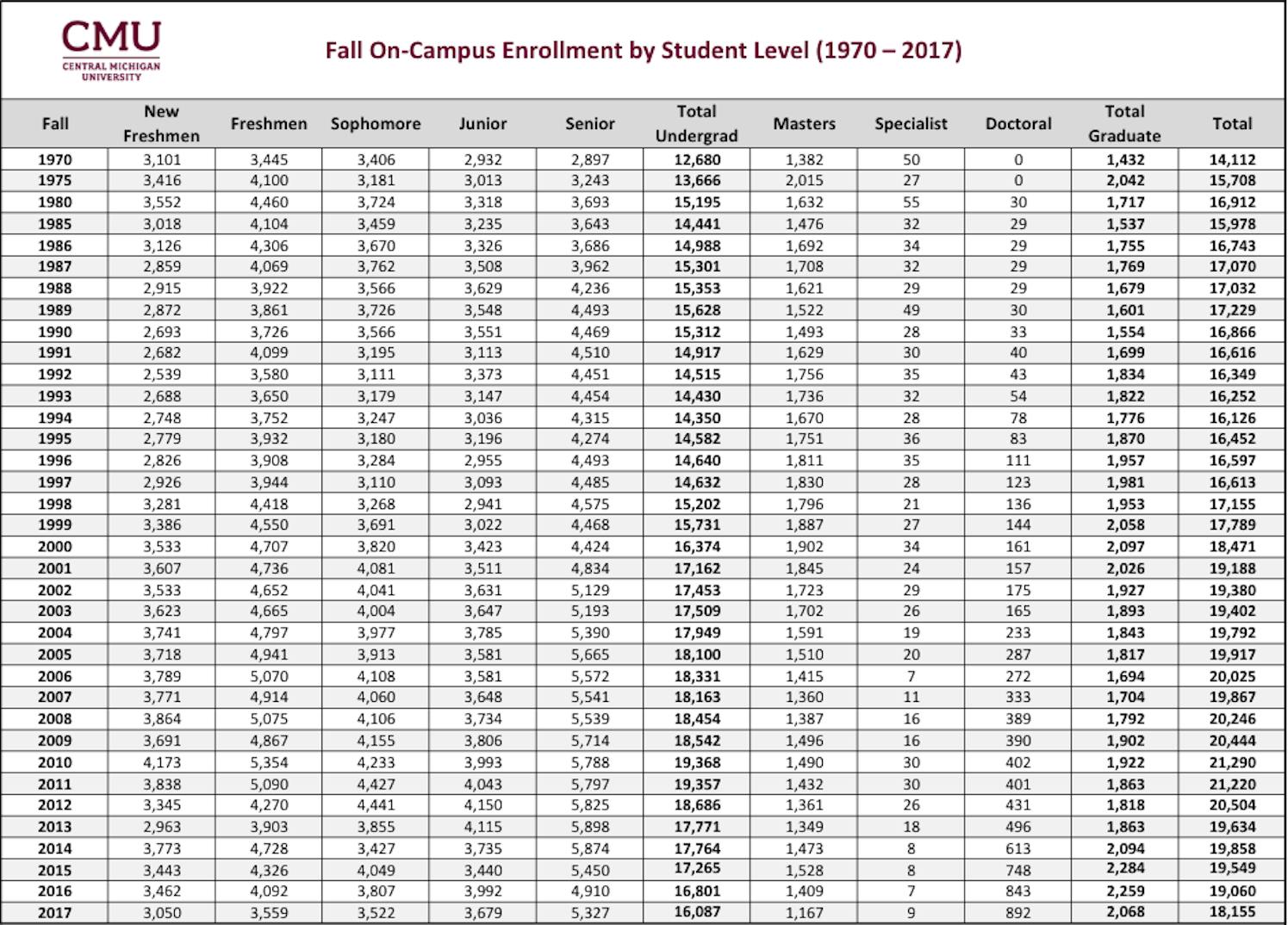Ross' legacy: a look back at the career of CMU's 14th president

George Ross addresses questions from the media during a press conference after he was named the 14th president of Central Michigan University Dec. 3, 2009.
The man who would become Central Michigan University's 14th president began his CMU career in 2002.
George Ross came to CMU after a three-year stint as executive vice president at Clark Atlanta University in Georgia. On Dec. 9, 2002, Ross began his duties as vice president for Finance and Administrative Services, replacing Abdul Nasser, who had resigned the previous May.
Then-President Michael Rao said Ross' experience in higher education finance is what gave him the edge over his competition.
“I think his higher education finance background is very strong,” Rao said. "Higher education throughout the country has begun to see quite a bit of a revenue decline from state sources, so I'd be surprised if too much is very new to him.”
The "experience" Rao referred to includes serving as vice president for Business and Fiscal Affairs at Tuskegee University in Alabama between 1991 and 1995, and time as executive vice chancellor for The University of Tennessee at Chattanooga between 1995 and 1999.
Ross oversaw the construction of several new buildings on campus, including the completion of the three-building, $33 million addition to the Towers residence hall complex — Kulhavi, Kesseler and Campbell halls, which opened in 2003.
In April 2007, Ross announced he would be leaving CMU to serve as president of Alcorn State University, the oldest historically-black public land-grant institution in the U.S.
Ross' return
Rao announced his departure as CMU's president in February 2009. Ross was chosen as Rao's replacement in December 2009, after a nearly year-long closed search which saw Kathy Wilbur serve as interim president.
Ross officially took his post in March 2010.
Reactions to Ross' selection were mostly positive.
“I think we’re going to be able to look back in years hence and say this is one of the best presidents we’ve ever had,” said Stephanie Comai, trustee and chair of the Presidential Screening Committee, in regards to the election.
Some faculty questioned the timing of the decision and the closed nature of the search. Lynn Dominguez, assistant professor of recreation parks and leisure services, said while she thought Ross was a quality pick, many were uncomfortable with the secrecy that surrounded the hiring. In later years Ross would recount being aggressively recruited for the job.
“I was a little shocked that the announcement was made without any public forums or interviews on campus that I knew of,” Dominguez said.
Ross' starting salary was $350,000 with a $50,000 signing bonus. That was $47,443 more than Rao's salary when he left CMU.

University President George Ross looks at his watch Monday afternoon while walking from Charles V. Park Library to Warriner Hall after a press conference as hundreds of protestors following behind chanting "negotiate now."
Ross' reign
His leadership qualities were put to the test not long after Ross took over as president.
In April 2011, a faculty strike arose out of a conflict between the Faculty Administration and the university. The FA cited unfair labor practices. The strike would continue through the first day of the following fall semester. After seven months of bargaining with the university, the FA ratified its contract on Jan. 12, 2012.
Ross and then-Provost Gary Shapiro were dealt a vote of "no confidence" by the Academic Senate in December 2011. A student-led initiative was presented by Student Senators Christopher Benison and Michelle Campbell at an Academic Senate meeting on Dec. 7. The motion was passed by a 52 percent majority.
The response from CMU administration was immediate.
“The board remains confident in the leadership of Drs. Ross and Shapiro and their commitment to the academic, personal and professional success for our students,” said Sarah Opperman, former chair of the CMU Board of Trustees.
Dean Pybus, graduate coordinator of the Department of Recreation, Parks and Leisure Services, voiced his support of the vote and that it was student-orchestrated.
"Ross, Shapiro and the board of trustees, through their actions, suggest they value hoarding money for the proposed College of Medicine,” Pybus said. “This has been shown not only in their dealings with faculty, but with other employee groups on campus."
The College of Medicine was established during a February 2010 board of trustees meeting. In Fall 2013, 64 students became CMED's inaugural class — of them 57 were Michigan students and 11 were CMU alumni. In May 2017, 62 of that first class graduated from the College of Medicine. All graduates have received residency placement.
During his tenure, several major building projects have been completed. Construction for the $95 million Biosciences Building began in 2014, with the building opening for student use in Fall 2016 and the first classes were held Spring 2017. The Biosciences Building was the largest construction project in CMU history.
Plans to expand the Herbert H. & Grace A. Dow College of Health Professions with the addition of a Center for Integrative Health Studies were realized with a groundbreaking ceremony April 19. Construction for the $26 million project will be completed by September 2019.
In 2013, CMU opened the Office of Student Success with the goal of increasing student retention. The amount of students graduating in 4 years has increased from 20.5 percent in 2010 to 27.8 percent in 2016.
However, Ross' presidency has been marked by decreases in student enrollment and increases in cost of attendance.
Since Ross became president, total enrollment has dropped from 21,290 students in 2010 to 18,155 in Fall 2017. Undergraduate tuition has risen from $346 per credit hour in 2010 to $417 in 2017.

On-campus enrollment from 1970-2017.
On-campus room and board rates have risen — the yearly rate with an unlimited meal plan in 2010 was $8,092. At the most recent board of trustees meeting on April 19, a 3.5 percent increase brought the yearly rate up to $10,076 for the 2018-19 fiscal year.
Ross said he made the choice to step down early December 2017. Before Christmas his first grandchild, Jorge, was born.






